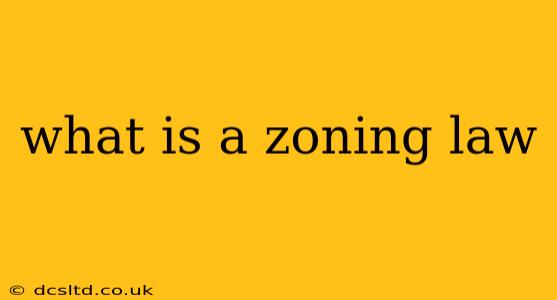Zoning laws are regulations that govern how land in a particular area can be used. They are a critical part of local government planning, aiming to organize the development and use of property within a municipality, county, or other jurisdiction. These laws dictate what types of buildings can be constructed on a given plot of land, their height, size, and density, as well as other crucial aspects related to land use. Essentially, they act as a blueprint for how a community will develop and function.
Why Do We Need Zoning Laws?
Zoning laws serve several essential purposes, all contributing to a more organized and functional community. These include:
- Protecting Property Values: By preventing incompatible land uses from existing side-by-side (e.g., a factory next to a residential area), zoning regulations help maintain and even enhance property values.
- Ensuring Public Safety: Zoning can minimize hazards by separating potentially dangerous industries from residential areas. It dictates building codes and safety standards, improving the overall safety of the community.
- Controlling Growth and Development: Zoning laws provide a framework for managing the pace and pattern of urban sprawl, preventing uncontrolled development that could strain infrastructure and resources.
- Protecting Natural Resources: Zoning can help safeguard environmentally sensitive areas by restricting development in wetlands, floodplains, or areas with unique ecological features.
- Promoting Community Character: Zoning can help preserve the unique character of a neighborhood by setting standards for building design, landscaping, and other aesthetic elements.
What Does a Zoning Law Typically Include?
Zoning ordinances are complex documents, but typically include several key components:
- Zoning Districts: These are geographical areas designated for specific uses, such as residential, commercial, industrial, or agricultural. Each district has its own set of regulations.
- Permitted Uses: Each zoning district outlines which land uses are allowed within its boundaries. Some uses might be permitted outright, while others may require a special permit or variance.
- Building Height and Size Restrictions: Zoning laws often specify maximum building heights and sizes to prevent overcrowding and maintain a desirable community aesthetic.
- Density Regulations: These restrictions control the number of dwelling units that can be built on a particular piece of land.
- Parking Requirements: Many zoning laws mandate a minimum number of parking spaces for commercial and residential developments.
- Setbacks: These regulations specify the minimum distance a building must be set back from property lines, streets, and other features.
- Lot Size Requirements: Zoning laws often stipulate the minimum size of a lot that can be developed.
How are Zoning Laws Enforced?
Zoning laws are enforced by local governments, often through a planning or zoning department. These departments review development proposals to ensure they comply with existing regulations. Violations can lead to fines, stop-work orders, or even legal action.
What are the Different Types of Zoning?
Several types of zoning exist, reflecting the diverse needs and priorities of different communities. These include:
- Residential Zoning: This designates areas for housing, including single-family homes, apartments, and townhouses. Variations within residential zoning often exist (e.g., R-1 for single-family homes, R-2 for multi-family).
- Commercial Zoning: This designates areas for businesses and retail establishments. Commercial zoning can be further subdivided into different categories depending on the intensity of use (e.g., neighborhood commercial, regional commercial).
- Industrial Zoning: This designates areas for manufacturing, warehousing, and other industrial activities.
- Agricultural Zoning: This protects farmland and other agricultural uses from encroachment by development.
Who Creates and Changes Zoning Laws?
Zoning laws are typically created and amended by local governing bodies, such as city councils or county commissions. The process often involves public hearings and community input to ensure that zoning regulations reflect the needs and desires of the residents.
How Can I Find My Local Zoning Laws?
To find your local zoning laws, you should contact your city or county planning department. Many jurisdictions also make their zoning ordinances available online.
What is a Zoning Variance?
A zoning variance is an exception to the rules. If a property owner believes that strict adherence to the zoning code would create an undue hardship, they may apply for a variance to allow a deviation from the regulations.
This overview provides a comprehensive understanding of zoning laws. Remember to consult your local government for specific regulations applicable to your area.
